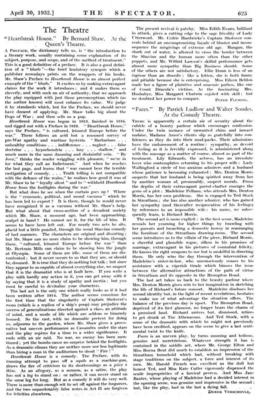The Theatre
"Heartbreak House." By Bernard Shaw. At the Queen's Theatre.
A PREFACE, the dictionary tells us, is " the introduction to a literary work, usually containing some explanation of its subject, purpose, and scope, and of the method of treatment." This is a good definition of a preface. It is also a good defini- tion of a " blurb "—the brief laudatory synopsis which a publisher nowadays prints on the wrappers of his books. Mr. Shaw's Preface to Heartbreak House is an almost perfect example of the " blurb." It excites us by making extravagant claims for the work it introduces ; and it makes them so cleverly, and with such an air of authority, that we approach the play equipped with just those preconceptions which (as the author knows) will most enhance its value. We judge it by standards which, but for the Preface, we should never have dreamt of applying. Mr. Shaw talks big about the Dogs of War ; and then sells us a pup.
Heartbreak House was begun in 1913, finished in 1916. and rigged out with a Preface in 1919. Heartbreak House," says the Preface, " is cultured, leisured Europe before the war." There follows an acid but a reasoned survey of pre-War apathy and wartime hysteria. " Barbarians . . unhealthy conditions . . . indifference . . neglect . . . false doctrine . . . hypochondria . . . lazy . . . shallow," and much more in the same damning and disdainful vein. By Jove," thinks the reader wriggling with pleasure, " we're in for what they call an Indictment." And when he reaches the last page, and learns that war cannot bear the terrible castigation of comedy. . . . Truth telling is not compatible with the defence of the realm," he realizes how good it was of Mr. Shaw to be " loyally silent " and to " withhold Heartbreak House from the footlights during the war."
But what does he see when the curtain goes up ? Where is the economic, political, and moral vacuum " which he has been led to expect ? It is there, though he would never have recognized it as a vacuum without Mr. Shaw's help. But what about that cross-section of a decadent society which Mr. Shaw, a moment ago. had been approaching, scalpel in hand ? He cannot see it, for the life of him. It seems to have been left out. For nearly two acts he sits, placid but a little puzzled, through the usual Shavian comedy of bad manners. The characters are original and diverting ; but Mr. Shaw can no more claim to be showing him, through them, " cultured, leisured Europe before the war " than Mr. BertraM Mills can claim to be showing him the jungle at Olympia. Some of them are idle, some of them are dis- contented ; but it never occurs to its that they are, or should be, doomed. It is true that they do nothing but talk ; but since they appear to us capable of almost everything else, we suspect that it is the dramatist who is at fault here. If you write a play with hardly any action in it, you can get away with it by saying that it is a study of apathy and inertia ; but you st be careful to devitalize your characters.
The last act is the only one which really looks as if it had been written after 1914. The author seems conscious for the first time that the singularity of Captain Shotover's room (which is a replica of a ship's poop) may prejudice the success of generalizations directed against a class, an attitude of mind, and a mode of life which are seldom so bizarrely housed. So the cast, with no dramatic pretext for doing KO, adjourns to the garden, where Mr. Shaw gives a provo. motive but uneven performance as Cassandra under the stars and the' play aspires for a time to a wider significance. It ends with an air raid. No war, no enemy has been men- tioned ; yet the bombs cause no surprise behind the footlights. As a dramatic climax they are neither more nor less legitimate than hiring a man in the auditorium to shout Fire ! " Heartbreak House is a comedy. The Preface, with its cunning attempt to pass off a squib as a machine-gun, draws the fire of criticism to its shortcomings as a pike a these. As an allegory, as a sermon, as a satire, the play has not a leg to stand on : or rather, it can never stand on the slime leg for long. But as a comedy it will do very well. There is more than enough wit to set off against thelongueurs, and the two unpardonably false notes.in Act II are forgiven for felicities elsewhere.
The present revival is patchy. Miss Edith Evans, brilliant in attack, gives a cutting edge to the sage frivolity of Lady Utterword. Mr. Cedric Hardwicke's Captain Shotover con- ceals behind an uncompromising facade of bluster and incon- sequence the misgivings of extreme old age. Mangan, the shark out of water, is allowed to cross the border between the Shavian and the human more often than the other puppets, and Mr. Wilfrid Lawson's skilful performance gets almost more sympathy than Big Business should. Some of the others are not satisfactory. Ellie Dunn is less of au ingenue than an dourdie ; like a kitten, she is both funny and pitiable because she is enterprising. Miss Eileen Beldon made her a figure of plaintive and anaemic pathos, like one of Count Dracula's victims. As the fascinating Mrs. Hushabye, Miss Margaret Chatwin cajoled with skill ; but






































 Previous page
Previous page